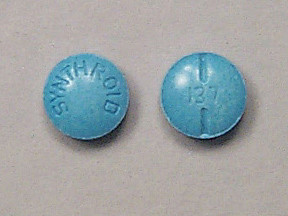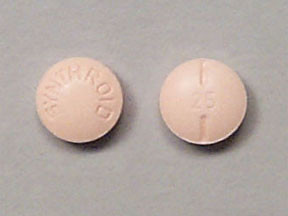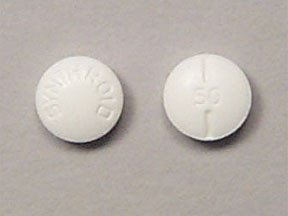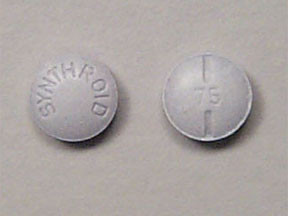LEVOTHYROXINE - ORAL
PHONETIC PRONUNCIATION: (lee-voe-thye-ROX-een)
COMMON BRAND NAME(S): Levothroid, Levoxyl, Synthroid, Unithroid
GENERIC NAME(S): levothyroxine sodium

Medically reviewed by Matt Sommers, PharmD. Last updated on September 01, 2023.
Uses
USES: Levothyroxine is used to treat an underactive thyroid (hypothyroidism). It replaces or provides more thyroid hormone, which is normally produced by the thyroid gland. Low thyroid hormone levels can occur naturally or when the thyroid gland is injured by radiation/medications or removed by surgery. Having enough thyroid hormone is important for maintaining normal mental and physical activity. In children, having enough thyroid hormone is important for normal mental and physical development. This medication is also used to treat other types of thyroid disorders (such as certain types of goiters, thyroid cancer). This medication should not be used to treat infertility unless it is caused by low thyroid hormone levels.
How to use LEVOTHYROXINE - ORAL
HOW TO USE: Read the Patient Information Leaflet if available from your pharmacist before you start taking levothyroxine and each time you get a refill. If you have any questions, ask your doctor or pharmacist. Take this medication by mouth as directed by your doctor, usually once daily on an empty stomach, 30 minutes to 1 hour before breakfast. Take this medication with a full glass of water unless your doctor directs you otherwise. If you are taking the capsule form of this medication, swallow it whole. Do not split, crush, or chew. People who cannot swallow the capsule whole (such as infants or small children) should use the tablet form of the medication. For infants or children who cannot swallow whole tablets, crush the tablet and mix in 1 to 2 teaspoons (5 to 10 milliliters) of water, and give using a spoon or dropper right away. Do not prepare a supply in advance or mix the tablet in soy infant formula. Consult your pharmacist for more information. Dosage is based on your age, weight, medical condition, laboratory test results, and response to treatment. Use this medication regularly in order to get the most benefit from it. To help you remember, take it at the same time each day. Do not stop taking this medication without first consulting with your doctor. Thyroid replacement treatment is usually taken for life. There are different brands of levothyroxine available. Do not change brands without first consulting your doctor or pharmacist. Certain medications (such as cholestyramine, colestipol, colesevelam, antacids, sucralfate, simethicone, iron, sodium polystyrene sulfonate, calcium supplements, orlistat, sevelamer, among others) can decrease the amount of thyroid hormone that is absorbed by your body. If you are taking any of these drugs, separate them from this medication by at least 4 hours. Symptoms of low thyroid hormone levels include tiredness, muscle aches, constipation, dry skin, weight gain, slow heartbeat, or sensitivity to cold. Tell your doctor if your condition worsens or persists after several weeks of taking this medication.
Side Effects
SIDE EFFECTS: See also Precautions section. Hair loss may occur during the first few months of treatment. This effect is usually temporary as your body adjusts to this medication. If this effect persists or worsens, tell your doctor or pharmacist promptly. It is important to note that low thyroid levels themselves can also cause hair loss. Remember that your doctor has prescribed this medication because he or she has judged that the benefit to you is greater than the risk of side effects. Many people using this medication do not have serious side effects. Tell your doctor right away if any of these unlikely but serious effects of high thyroid hormone levels occur: increased sweating, sensitivity to heat, mental/mood changes (such as nervousness, mood swings), tiredness, diarrhea, shaking (tremor), headache, shortness of breath, bone pain, easily broken bones. Get medical help right away if any of these rare but serious effects of high thyroid hormone levels occur: chest pain, fast/pounding/irregular heartbeat, swelling hands/ankles/feet, seizures. A very serious allergic reaction to this drug is rare. However, get medical help right away if you notice any symptoms of a serious allergic reaction, including: rash, itching/swelling (especially of the face/tongue/throat), severe dizziness, trouble breathing. This is not a complete list of possible side effects. If you notice other effects not listed above, contact your doctor or pharmacist. In the US - Call your doctor for medical advice about side effects. You may report side effects to FDA at 1-800-FDA-1088 or at www.fda.gov/medwatch. In Canada - Call your doctor for medical advice about side effects. You may report side effects to Health Canada at 1-866-234-2345.
Precautions
PRECAUTIONS: Before taking levothyroxine, tell your doctor or pharmacist if you are allergic to it; or if you have any other allergies. This product may contain inactive ingredients, which can cause allergic reactions or other problems. Talk to your pharmacist for more details. Before using this medication, tell your doctor or pharmacist your medical history, especially of: increased thyroid hormones (thyrotoxicosis), decreased adrenal gland function, heart disease (such as coronary artery disease, irregular heartbeat), high blood pressure, diabetes. If you have diabetes, this drug may affect your blood sugar. Check your blood sugar regularly as directed and share the results with your doctor. Tell your doctor right away if you have symptoms such as increased thirst/urination, shakiness, unusual sweating, dizziness, or hunger. Your doctor may need to adjust your diabetes medication, exercise program, or diet. Before having surgery, tell your doctor or dentist about all the products you use (including prescription drugs, nonprescription drugs, and herbal products). Children may be more sensitive to certain side effects of this drug, especially headache, vision changes, and hip/leg pain. High thyroid hormone levels may lead to decreased bone development/growth and reduced full adult height. Keep all lab/medical appointments so the doctor can monitor treatment. Older adults may be more sensitive to the side effects of this drug, especially fast/pounding/irregular heartbeat. Current information shows that this drug may be used during pregnancy. Tell your doctor if you are pregnant because your dose may need to be adjusted. Levothyroxine passes into breast milk but is unlikely to harm a nursing infant. Consult your doctor before breast-feeding.
Interactions
DRUG INTERACTIONS: Certain medications (such as cholestyramine, colestipol, colesevelam, antacids, sucralfate, simethicone, iron, sodium polystyrene sulfonate, calcium supplements, orlistat, sevelamer, among others) can decrease the amount of thyroid hormone that is absorbed by your body. If you are taking any of these drugs, separate them from this medication by at least 4 hours.
See also How to Use Section. Drug interactions may change how your medications work or increase your risk for serious side effects. This document does not contain all possible drug interactions. Keep a list of all the products you use (including prescription/nonprescription drugs and herbal products) and share it with your doctor and pharmacist. Do not start, stop, or change the dosage of any medicines without your doctor's approval. Some products that may interact with this drug include: "blood thinners" (such as warfarin), digoxin, sucroferric oxyhydroxide.
Overdose
OVERDOSE: If someone has overdosed and has serious symptoms such as passing out or trouble breathing, call 911. Otherwise, call a poison control center right away. US residents can call their local poison control center at 1-800-222-1222. Canada residents can call a provincial poison control center. Symptoms of overdose may include: fast/pounding/irregular heartbeat, loss of consciousness, confusion, seizures.
Images

- color
- turquoise
- shape
- round
- imprint
- SYNTHROID, 137

- color
- turquoise
- shape
- round
- imprint
- SYNTHROID, 137
Reviews
Faq for LEVOTHYROXINE - ORAL
Levothyroxine is used to treat an underactive thyroid (hypothyroidism). It replaces or provides more thyroid hormone, which is normally produced by the thyroid gland.
Take Levothyroxine exactly as prescribed by your doctor. It is usually taken once a day on an empty stomach, at least 30 minutes before eating. Follow the instructions on your prescription label.
If you forget to take a dose, take it as soon as you remember unless it is almost time for your next scheduled dose. In that case, skip the missed dose and resume your regular dosing schedule. Do not take double or extra doses to make up for a missed dose.
Common side effects of Levothyroxine may include headache, weight loss, tremors, increased appetite, nervousness, and diarrhea. If any of these side effects persist or worsen, contact your doctor.
Levothyroxine may interact with certain medications or supplements, so it is important to inform your doctor about all the medications you are taking. Some drugs that may interact with Levothyroxine include antacids, antidepressants, blood thinners, insulin, and cholesterol medications.
It may take several weeks to notice the full benefits of Levothyroxine. However, some symptoms such as fatigue and increased energy levels may start improving within a few days.
Levothyroxine is generally considered safe to take during pregnancy. It is important to continue taking the medication as prescribed and inform your doctor if you become pregnant or are planning to become pregnant.
If you experience signs of an allergic reaction such as hives, difficulty breathing, or swelling of the face, lips, tongue, or throat, seek immediate medical attention.
Taking too much Levothyroxine can cause symptoms of overdose, including chest pain, irregular heartbeat, rapid or pounding heartbeat, shortness of breath, tremors, confusion, or seizures. If you suspect an overdose, seek immediate medical assistance.
Warning
WARNING: This medication should not be used for weight loss. Normal doses of this medication will not work for weight loss, and large doses of this medication may cause serious, possibly fatal side effects, especially when taken with diet pills.
Disclaimer
IMPORTANT: HOW TO USE THIS INFORMATION: This is a summary and does NOT have all possible information about this product. This information does not assure that this product is safe, effective, or appropriate for you. This information is not individual medical advice and does not substitute for the advice of your health care professional. Always ask your health care professional for complete information about this product and your specific health needs.



For None: What if my dog ate some what can happen to her
By Baby girl on 19 Mar, 2023
For i had take: i took this medcation for 10 years everything was fine now they change and im mess
By bella on 30 Mar, 2025